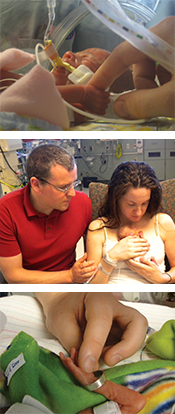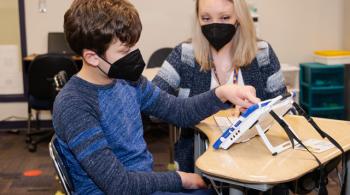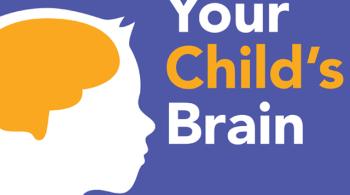By Kristina Rolfes
It seems like an obvious fact of life: if a child is hungry enough, he will eat. Yet for some children with a history of prematurity or developmental disorders, eating is a skill that does not develop automatically.
When quadruplets Timmy, Edda, Lily, and Wyatt were born prematurely at 24 weeks’ gestation, their parents, Anne and Rob, knew their babies would face continuing medical complications. But they didn’t anticipate how much of a struggle the simple act of eating would be.
All four babies had severe reflux and were not consuming sufficient amounts to grow. No matter what Anne and Rob tried, they could not get their babies to take a bottle. At times it seemed their lives revolved only around trying to feed their children, and with each feeding came more stress. As the days and weeks turned into months, their tiny babies remained the size of newborns. With their pediatrician’s advice, Anne and Rob made the difficult decision to get G-tubes (feeding tubes that deliver nutrition directly into the body) for their children.

While the feeding tubes resolved their immediate concerns about nutrition, a new set of problems emerged. Typical daycare centers weren’t equipped to administer tube feedings. Going out required packing and lugging an enormous amount of feeding supplies. And family activities like going to a restaurant, hiking, or visiting relatives were just too much work.
Advice from others, though well-meaning, made matters all the more frustrating: “make eating more fun,” “try giving them applesauce,” and “eventually they’ll grow out of it” were some of the suggestions offered. “Everybody thinks they have the solution, only it just never really works,” recalls Anne. “It was a very isolating experience.”
No one seemed to understand the depth of the problem or how to address it until the family found the Feeding Disorders Program at Kennedy Krieger Institute, a nationally recognized program that specializes in treating children with feeding disorders.
“It was the first place we had been that looked at, and investigated, all the possible reasons why each one of our children might not be succeeding,” says Rob of the program, which the children entered when they were 3 years old.
Solving the Puzzle
Many factors can contribute to a feeding disorder (a child’s inability or refusal to consume enough food to meet nutritional needs and grow normally). Some children have medical problems like gastroesophageal reflux, while others lack the oral-motor skills required to chew and swallow food. When issues like these arise, eating can become such an aversive experience that children may begin to refuse food. It’s much more than just picky eating; children with feeding disorders need medical intervention.

Successfully treating a feeding disorder is a complicated endeavor that requires tackling multiple medical and behavioral issues all at once. “Every child had a different medical history and experience, so each child needed a unique approach,” says Peter Girolami, PhD, BCBA-D, director of the Pediatric Feeding Disorders Program. “We had a team of specialists—from pediatrics, behavioral psychology, nutrition, social work, occupational therapy, and speech-language pathology—all working to identify and address the multiple factors that may have been contributing to the child’s feeding disorder.”
Senior behavior analyst Carrie Borrero, PhD, BCBA-D, who oversaw the quadruplets’ care at Kennedy Krieger, explains, “The first thing we do is watch parents feed their children so we get an idea of what they are dealing with at home.”
Unless you are a parent of multiples, it’s hard to imagine how formidable a challenge it can be to persuade four toddlers to do anything they don’t want to. At the sight of a spoon, all of the quadruplets would turn their heads and cry to avoid taking a bite. Chaos ensued.
Reward the Good, Ignore the Bad
Therapists needed to create a new normal for feeding time. Behavioral modification is easier said than done, but experience has shown that children respond best to positive reinforcement.

In practice, it happens like this: when a child performs the desired behavior (takes a bite), the therapist gives praise and positive reinforcement, including a reward, which might include clapping, singing, or the opportunity to play with toys, watch TV, or whatever activity the child loves best. Any negative behaviors (crying or refusal) are ignored. Before long, the child learns that taking a bite and receiving the reward is much preferred to not complying and being ignored.
Sometimes therapists need to get creative, as was the case with the quadruplets. “We tried to take advantage of the fact that there were four of them,” says Borrero. “We would give each child a badge if they took all of their bites. They’d walk around with their badges and they would keep up with what each other was doing.”
The feeding process happened three times a day, every day. And in between feedings, occupational and speech therapists were helping children work on skills needed for eating and drinking, such as chewing and swallowing. The team gradually worked to increase the amount of food, type of food, and varying textures. Parents observed the interactions, while therapists taught them how to respond to certain behaviors.
Success Times Four

After eight weeks of intense work with the feeding specialists, the quadruplets were able to eat independently and no longer needed their feeding tubes. The family left with a plan they could implement at home and phone numbers to call if they ran into hurdles. The children received follow-up care, including outpatient therapy and a home visit.
Three years later, all four children eat a variety of foods and can sit down for a family meal. “The simple goal that I didn’t think we would ever realize was for our family to be able to go out to a restaurant and order off the menu,” says Anne. “Now we can.”
The experience has been life-changing for the family. “Kennedy Krieger made it possible for our family to live a normal life,” says Rob. Anne concurs: “We can go out and do all the activities you dream of doing with children…. We can focus now on our children rather than our children’s eating.”
To learn more about treatment plans for feeding disorders at Kennedy Krieger Institute, visit the Pediatric Feeding Disorders Program page.















